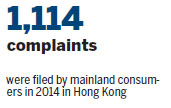Retail industry told to police itself over recent 'price scams'
Updated: 2015-07-24 07:58
By Luis Liu in Hong Kong(HK Edition)
|
|||||||
The Consumer Council urged the local retail industry on Thursday to discipline itself and warned of blacklisting shops engaging in dishonest practices.
The call came in response to a recent case in which a mainland tourist paid almost HK$40,000 for two bottles of herbal oil at a pharmacy in Causeway Bay.
After mediation by the council, the Prestige Pharmacy agreed to refund the money. The council is still trying to contact the tourist.
Council Chief Executive Gilly Wong Fung-han urged local retailers to discipline themselves and "not to tarnish Hong Kong's image".
Wong is considering whether or not to blacklist the shop and publicize its name as a warning.
The female tourist was from the southeastern province of Fujian. She experienced the "price scam" when entering the password on a payment system when settling her bill last Friday. The woman was unaware there was a price tag of HK$19,800 on each bottle.
In another case in April, a man from the eastern province of Jiangsu had to pay more than 10 times the market price for some herbs after he was shown the wrong price. The case occurred at a shop on the Avenue of Stars at the Tsim Sha Tsui harbor front.
In recent years, a growing number of complaints have been filed by mainland consumers. According to the latest statistics in 2014, the council received 1,114 complaints on sales practices, up from 2013's 921 cases. Some 274 of these were related to traditional Chinese medicine.
Chairman of Hong Kong General Chamber of Pharmacy Lau Oi-kwok said the chamber was now looking into the case. Lau urged Prestige Pharmacy to formally apologize.
He said the incident had hurt Hong Kong's reputation. The industry would not allow individual cases to damage consumers' confidence in Hong Kong's pharmacies.
However, the Consumer Council admitted that such conduct might not be breaking the law because Hong Kong is a free market. Worse still, the council had no right to directly enforce the law against shops which might have engaged in malpractice.
The council advised mainland consumers to compare prices between shops before buying products. If involved in disputes, consumers should keep evidence for future legal action, the council advised.
Retail industry lawmaker Vincent Fang Kang said the pharmacy violated the "No Fakes Pledge" Scheme. He said he would work with industry associations to investigate and to prevent such incidents from happening again.
The Intellectual Property Department launched the "No Fakes Pledge" Scheme in 1998. This was to strengthen the city's reputation as a "shopping paradise" for genuine products with regular prices.
Fang said that in reality it was hard to resolve such problems through legislation. This was because Hong Kong's free market status meant it was not a suitable place for price regulations. Legislation could also take a very long time.
However, another legislator, James To Kun-sun, had a different view. He said the government could give the council the power to arbitrate small claims.
luisliu@chinadailyhk.com

(HK Edition 07/24/2015 page6)